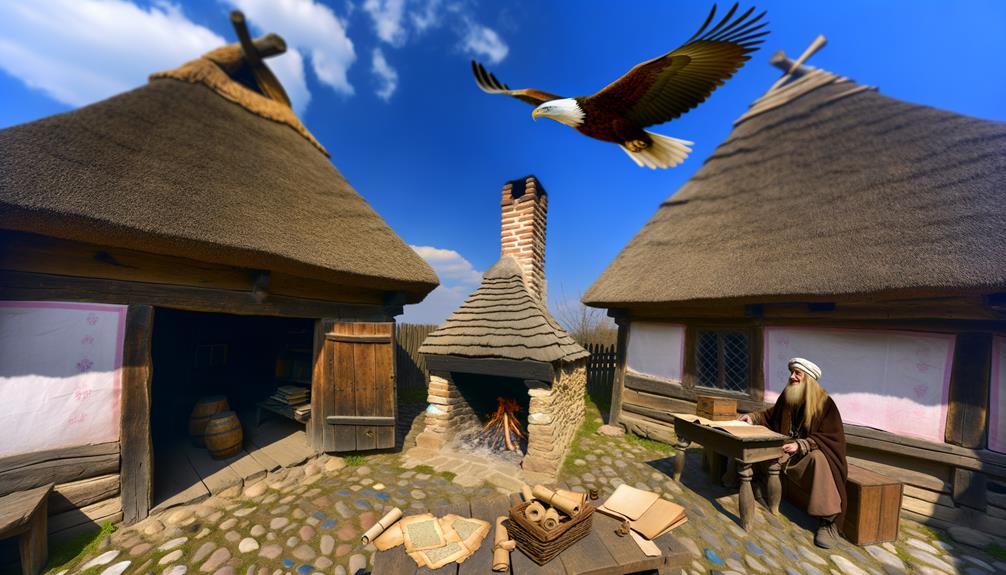Edgar Name Meaning and Origin
The name Edgar, originating from Old English, is a blend of the words for 'wealth' and 'spear,' symbolizing prosperity and martial prowess. Historically, it traces back to notable figures like Edgar the Peaceful, a 10th-century king of England known for his stable reign and legal reforms.
The name conveys traits of nobility and resilience, evident in its adoption by literary figures like Edgar Allan Poe. Despite fluctuations in popularity, Edgar maintains a timeless appeal, balancing historical gravitas with modern adaptability.
Insight into its continued cultural resonance and notable namesakes awaits those interested.

Key Takeaways
- Edgar originates from Old English, combining elements meaning wealth and spear.
- The name implies material prosperity and martial prowess.
- It has historical significance from the Anglo-Saxon era, particularly with King Edgar the Peaceful.
- Edgar signifies nobility, fortitude, and a balance between affluence and valor.
- The name maintains cultural and literary resonance, notably through figures like Edgar Allan Poe and Shakespeare's 'King Lear'.
Historical Background
The name Edgar has a rich historical background tracing back to the Anglo-Saxon era, where it was borne by notable figures such as Edgar the Peaceful, a 10th-century king of England. Edgar the Peaceful's reign from 959 to 975 AD is often highlighted for its relative stability and consolidation of the English kingdom. This period saw the development of a more unified legal system and the promotion of monastic reforms, shaping medieval England in a noteworthy manner.
Moreover, the name Edgar persisted through subsequent generations, appearing in various historical records and literary works. Its endurance across centuries underscores its historical significance, providing a window into the cultural and political landscape of early England. This historical backdrop enriches the contemporary appreciation of the name Edgar.
Etymology and Meaning
Originating from Old English, the name Edgar combines the elements 'ēad,' meaning wealth or fortune, and 'gār,' meaning spear. This etymological blend signifies a person of both material prosperity and martial prowess, reflecting the socio-cultural values of early medieval England.
The significance of 'ēad' underscores the importance of wealth and success, while 'gār' conveys strength and protection, attributes essential to survival and leadership in a warrior society. This duality of meaning imbues the name Edgar with a sense of balance between affluence and valor.
Consequently, the name has been favored for its connotations of nobility and fortitude, traits that were highly esteemed in the historical context from which it emerged.
Famous Bearers
Throughout history, the name Edgar has been borne by numerous notable individuals, each contributing to its enduring legacy in diverse fields such as literature, politics, and the arts.
Edgar Allan Poe, a prominent 19th-century American writer, is renowned for his contributions to the Gothic genre and detective fiction.
In the domain of politics, Edgar the Peaceful, a 10th-century English king, played a pivotal role in consolidating the kingdom of England.
Additionally, Edgar Degas, a distinguished French artist, left an indelible mark on the world of visual arts through his innovative contributions to Impressionism.
These figures exemplify the versatility and enduring appeal of the name Edgar across various domains, underscoring its historical and cultural significance.
Literary Significance
The name Edgar holds a notable position in classic literature, prominently featured in works such as Shakespeare's 'King Lear,' where the character Edgar epitomizes themes of loyalty and resilience.
Additionally, modern literary references continue to employ the name, reflecting its enduring appeal and versatility.
This examination of Edgar's literary significance underscores its deep-rooted cultural resonance across various time periods and genres.
Edgar in Classic Literature
Edgar, as a character name, holds significant literary weight, prominently featured in William Shakespeare's 'King Lear' and Edgar Allan Poe's works.
In 'King Lear', Edgar is the legitimate son of the Duke of Gloucester, embodying themes of loyalty, justice, and transformation. His journey from a naive youth to a wise, resilient survivor underscores the play's exploration of human suffering and redemption.
Conversely, Edgar Allan Poe, a master of macabre and mystery, chose his own name as his literary identity, thereby embedding 'Edgar' within the gothic tradition. Characters in Poe's stories often reflect his thematic preoccupations with death, loss, and psychological torment, solidifying 'Edgar' as a name resonating with depth and complexity in classic literature.
Modern Literary References
Modern literature continues to draw upon the name 'Edgar,' weaving it into narratives that explore contemporary themes and character complexities, thereby maintaining its enduring literary resonance. This name often features in works that explore the human condition, existential dilemmas, and moral quandaries.
Here are four notable modern literary references that exemplify this trend:
- Edgar Freemantle in Stephen King's 'Duma Key': A character embodying themes of recovery and artistic expression.
- Edgar Mint in Brady Udall's 'The Miracle Life of Edgar Mint': A tale of survival and identity.
- Edgar Stark in Patrick McGrath's 'Asylum': An exploration of obsession and madness.
- Edgar Sawtelle in David Wroblewski's 'The Story of Edgar Sawtelle': A modern retelling of Shakespeare's 'Hamlet.'
These examples underscore the name's lasting significance in modern literary landscapes.
Popularity Over Time
Tracking the popularity of the name Edgar reveals notable fluctuations over the decades, shaped by cultural, social, and literary influences.
According to historical records, Edgar maintained a steady presence in the early 20th century, benefiting from literary figures such as Edgar Allan Poe. However, its popularity waned mid-century, reflecting broader societal shifts towards newer, trendier names.
The late 20th century saw a resurgence, albeit modest, likely influenced by a renewed interest in classic names.
Data from the Social Security Administration indicates that Edgar's popularity has experienced minor but consistent declines in the 21st century. This trend underscores a preference for more contemporary names, even as Edgar remains a perennial favorite among those who appreciate its historical and literary connotations.
Cultural Variations
While the popularity of the name Edgar has varied over time, its cultural variations reveal a rich tapestry of meanings and significance across different regions and traditions.
The name Edgar finds remarkable resonance in various cultures, each attributing unique connotations and historical contexts.
- Anglo-Saxon: Originating from Old English, Edgar combines 'ēad' (wealth, fortune) with 'gār' (spear), signifying a prosperous warrior.
- Scandinavian: In Norse mythology, Edgar is seen as a name of strength and courage, often associated with legendary figures.
- Latin American: Adapted as Édgar, it remains a popular choice, reflecting colonial influences and continued cultural appeal.
- French: In French-speaking regions, Edgar is celebrated for its literary connections, notably in the works of Edgar Allan Poe.
This cultural diversity underscores Edgar's enduring relevance across epochs and societies.
Modern Usage
In contemporary contexts, the name Edgar has seen fluctuating popularity, often influenced by its appearances in media and literature. Celebrity baby name choices frequently bring traditional names like Edgar back into the spotlight, contributing to periodic resurgences in its use.
Current naming trends also reflect a blend of classic and modern preferences, positioning Edgar as a timeless yet adaptable option.
Popularity in Media
The name Edgar has seen a resurgence in contemporary media, prominently featured in various films, television series, and literary works that have contributed to its renewed popularity. This revival can be attributed to its association with strong, memorable characters in modern storytelling.
A closer examination reveals several notable instances:
- 'Edgar Allan Poe' – Frequently referenced in films and TV shows, leveraging the name's literary legacy.
- 'Edgar Wright' – A prominent filmmaker whose success has brought attention to the name.
- 'Edgar Ross' – A significant character in the popular video game series 'Red Dead Redemption.'
- 'Edgar the Bug' – An iconic antagonist in the film 'Men in Black.'
These references have collectively enhanced the name's contemporary cultural footprint.
Celebrity Baby Names
Beyond its resurgence in media, the name Edgar has also gained traction among celebrities choosing distinctive names for their children, reflecting modern trends and cultural influences.
This renewed interest in Edgar is evident in its selection by high-profile figures seeking to balance uniqueness with tradition. Celebrities often opt for names that convey a sense of timelessness and literary heritage, and Edgar, with its historical and artistic connotations, fits this criterion.
For instance, notable figures like actor Sean Penn named his son Hopper Jack Penn, where Edgar was considered as a middle name, demonstrating its appeal. Such choices underscore a broader trend where the name Edgar is embraced for its classic charm and enduring relevance in contemporary society. This popularity highlights a growing appreciation for names that carry historical weight and cultural significance. Additionally, names like Edgar resonate with families who value tradition and heritage, often prompting research into the dunn surname history and significance to establish a meaningful connection to their lineage. As more parents seek names that reflect a rich narrative, Edgar remains a compelling choice that bridges the past and the present.
Contemporary Name Trends
Edgar's resurgence in contemporary name trends can be attributed to its blend of historical gravitas and modern adaptability, making it a popular choice among new parents. This name has seen a notable increase in usage due to several factors:
- Cultural Revival: Historical names are being revived as they carry a sense of tradition and nobility.
- Literary Influence: Figures like Edgar Allan Poe continue to inspire parents seeking a name with literary significance.
- Media Exposure: Characters named Edgar in popular media have reignited interest in the name.
- Global Appeal: The name's simplicity and ease of pronunciation make it accessible across different cultures and languages.
These elements underscore Edgar's enduring relevance in a modern context, appealing to today's discerning parents.
Naming Trends
Significantly, naming trends often reflect broader societal shifts and cultural influences, making the analysis of names like Edgar particularly insightful. Historically rooted in Old English, Edgar gained prominence due to its association with nobility and literature. Its resurgence in modern times can be linked to a growing appreciation for classic and timeless names, as well as a desire for uniqueness in an era dominated by more common names.
Additionally, the cyclical nature of naming patterns often breathes new life into traditional names. Contemporary parents might also be drawn to Edgar for its strong historical connotations and its relative rarity.
Conclusion
The name Edgar, steeped in a rich tapestry of history, etymology, and cultural significance, stands as a monumental proof to its enduring appeal. It has traversed centuries, gracing the annals of literature and the echelons of fame with unparalleled prominence. Its persistent popularity and varied cultural adaptations underscore its remarkable versatility.
Edgar is not merely a name; it is a historical epic, an etymological marvel, and a cultural phenomenon that continues to captivate and inspire.






